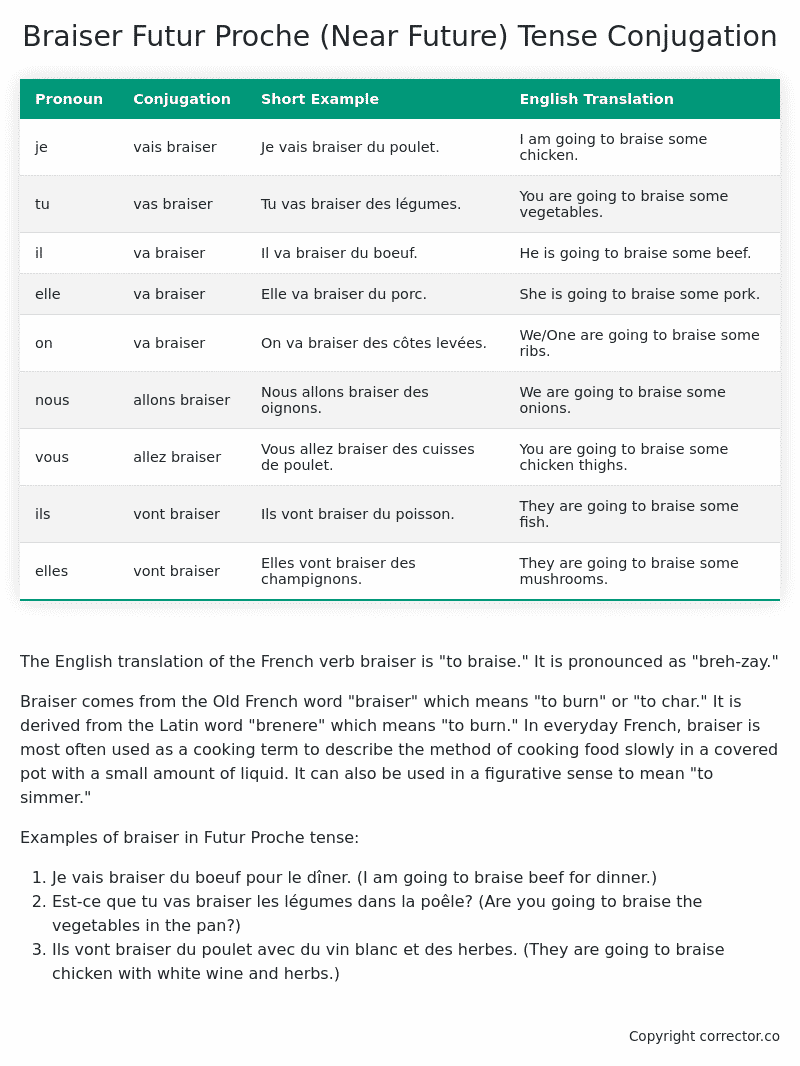Futur Proche (Near Future) Tense Conjugation of the French Verb braiser
Introduction to the verb braiser
The English translation of the French verb braiser is “to braise.” It is pronounced as “breh-zay.”
Braiser comes from the Old French word “braiser” which means “to burn” or “to char.” It is derived from the Latin word “brenere” which means “to burn.” In everyday French, braiser is most often used as a cooking term to describe the method of cooking food slowly in a covered pot with a small amount of liquid. It can also be used in a figurative sense to mean “to simmer.”
Examples of braiser in Futur Proche tense:
- Je vais braiser du boeuf pour le dîner. (I am going to braise beef for dinner.)
- Est-ce que tu vas braiser les légumes dans la poêle? (Are you going to braise the vegetables in the pan?)
- Ils vont braiser du poulet avec du vin blanc et des herbes. (They are going to braise chicken with white wine and herbs.)
Table of the Futur Proche (Near Future) Tense Conjugation of braiser
| Pronoun | Conjugation | Short Example | English Translation |
|---|---|---|---|
| je | vais braiser | Je vais braiser du poulet. | I am going to braise some chicken. |
| tu | vas braiser | Tu vas braiser des légumes. | You are going to braise some vegetables. |
| il | va braiser | Il va braiser du boeuf. | He is going to braise some beef. |
| elle | va braiser | Elle va braiser du porc. | She is going to braise some pork. |
| on | va braiser | On va braiser des côtes levées. | We/One are going to braise some ribs. |
| nous | allons braiser | Nous allons braiser des oignons. | We are going to braise some onions. |
| vous | allez braiser | Vous allez braiser des cuisses de poulet. | You are going to braise some chicken thighs. |
| ils | vont braiser | Ils vont braiser du poisson. | They are going to braise some fish. |
| elles | vont braiser | Elles vont braiser des champignons. | They are going to braise some mushrooms. |
Other Conjugations for Braiser.
Le Present (Present Tense) Conjugation of the French Verb braiser
Imparfait (Imperfect) Tense Conjugation of the French Verb braiser
Passé Simple (Simple Past) Tense Conjugation of the French Verb braiser
Passé Composé (Present Perfect) Tense Conjugation of the French Verb braiser
Futur Simple (Simple Future) Tense Conjugation of the French Verb braiser
Futur Proche (Near Future) Tense Conjugation of the French Verb braiser (this article)
Plus-que-parfait (Pluperfect) Tense Conjugation of the French Verb braiser
Passé Antérieur (Past Anterior) Tense Conjugation of the French Verb braiser
Futur Antérieur (Future Anterior) Tense Conjugation of the French Verb braiser
Subjonctif Présent (Subjunctive Present) Tense Conjugation of the French Verb braiser
Subjonctif Passé (Subjunctive Past) Tense Conjugation of the French Verb braiser
Subjonctif Imparfait (Subjunctive Imperfect) Tense Conjugation of the French Verb braiser
Subjonctif Plus-que-parfait (Subjunctive Pluperfect) Tense Conjugation of the French Verb braiser
Conditionnel Présent (Conditional Present) Tense Conjugation of the French Verb braiser
Conditionnel Passé (Conditional Past) Tense Conjugation of the French Verb braiser
L’impératif Présent (Imperative Present) Tense Conjugation of the French Verb braiser
L’infinitif Présent (Infinitive Present) Tense Conjugation of the French Verb braiser
Struggling with French verbs or the language in general? Why not use our free French Grammar Checker – no registration required!
Get a FREE Download Study Sheet of this Conjugation 🔥
Simply right click the image below, click “save image” and get your free reference for the braiser Futur Proche tense conjugation!

Braiser – About the French Futur Proche (Near Future) Tense
Formation
1. Conjugate “aller” in the present tense according to the subject pronoun:
2. Add the infinitive of the main verb immediately after “aller.” For example:
Common Everyday Usage
Interactions with Other Tenses
Present Tense
Past Tense
Conditional Tense
Summary
I hope you enjoyed this article on the verb braiser. Still in a learning mood? Check out another TOTALLY random French verb conjugation!


